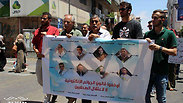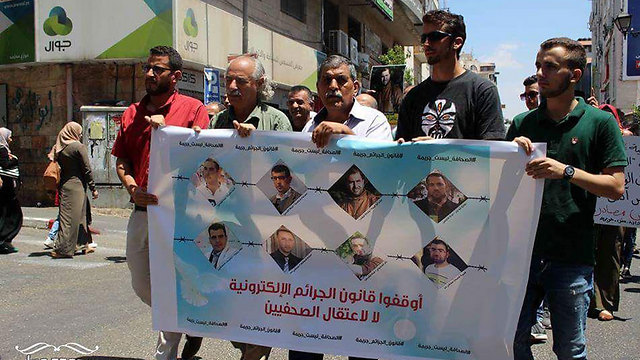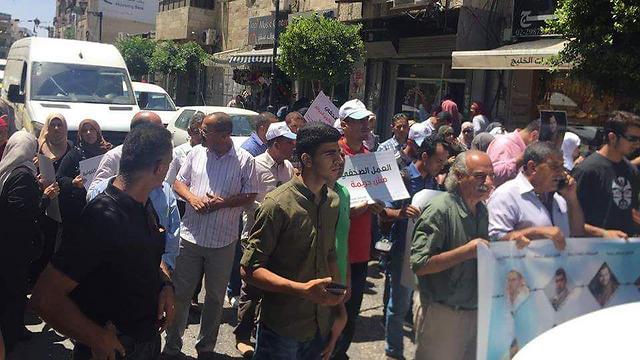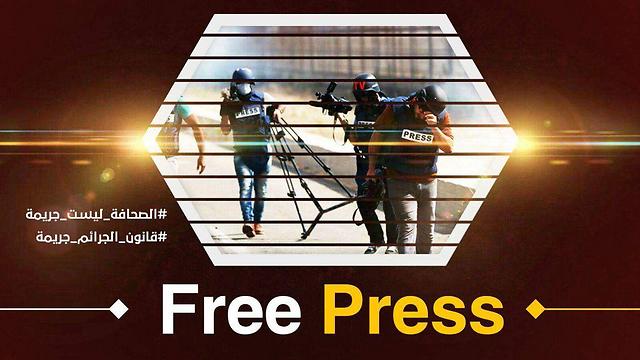
Palestinians protest against PA's arrest of journalists
Palestinian Authority passes law allowing closure of websites and arrests of journalists criticizing Fatah and Mahmoud Abbas, followed by website shutdowns and journalists' arrests; Palestinian public is outraged.
A major public outcry broke out last week after Palestinian Authority security forces detained five journalists working for Hamas-affiliated media outlets, including Al-Quds TV, while several other journalists were detained for questioning and asked about their recent social media posts.
The journalists were arrested under a new law according to which sites that criticize the Palestinian Authority, its ruling party Fatah or the PA President Mahmoud Abbas will be closed.
The new law was passed after about two months ago rumors began circulate that Abbas has died. The rumors quickly spread and forced Abbas to go out to the streets of Ramallah with a camera crew to document him talking to the surprised residents to prove that he is alive and in good health.
An investigation by the security services revealed that the source of the rumor was people that wanted to create disinformation and confusion—through social media—about the situation of the 82-year-old chairman .The name of his rival, Mohammed Dahlan, also emerged as one of those responsible for disseminating the false information.
As a result, the Palestinian Authority decided to take a drastic step and pass a law against electronic crimes with the sole purpose of closing sites that criticize the PA, Fatah and Abbas.
The Palestinian attorney general denied that the move was intended to suppress protests and claimed that he was closing legal loopholes that had previously allowed criminals in the virtual space to evade punishment, but reality proved otherwise. Within a month, dozens of Palestinian sites were closed, most of them identified with Abbas' two main rivals—Hamas and Dahlan.
"This law is one of the worst ones written since the establishment of the Palestinian Authority in 1994," said Amar Dweik, head of Palestinian Independent Commission for Human Rights. "This is a significant step back for freedoms in the West Bank."
Journalists in the West Bank and the Gaza Strip have for years complained of abuse by the Palestinian Authority in the West Bank and Hamas in Gaza, who they claim infringe on freedom of the press. Abbas' office is careful not to respond to these accusations and has put that responsibility on the enforcement authorities and the Justice Ministry.
On Saturday, the Palestinian security services announced that they were extending the detention of the aforementioned journalists because of the actions they carried out and their damage to the general security in the West Bank. The security forces linked the same acts to the connection of those journalists with Hamas.
However, arrests were also made against citizens who wrote articles criticizing Abbas, such as that of Emad al-Masri, a mid-level manager in the Palestinian Health Ministry.
Al-Masri used to criticize the sanctions imposed by Abbas on Hamas in the Gaza Strip and was subsequently arrested and sentenced to two years in prison, which were reduced to three months' imprisonment or a fine. "I think they intended to threaten and frighten me," said al-Masri after he was forced to pay a fine of $ 130.
In Ramallah, demonstrations are held from time to time, calling for the release of imprisoned journalists. On social media, the hashtag "The press is not a crime" became viral.
Meanwhile, Israeli reporters who cover events in the Palestinian territories became scapegoats for the Palestinian journalists' union and the activists. The images of Israeli journalists are distributed on social networks as being protected by the Palestinian Authority, as opposed to Palestinian journalists who are currently suffering from abuse.














